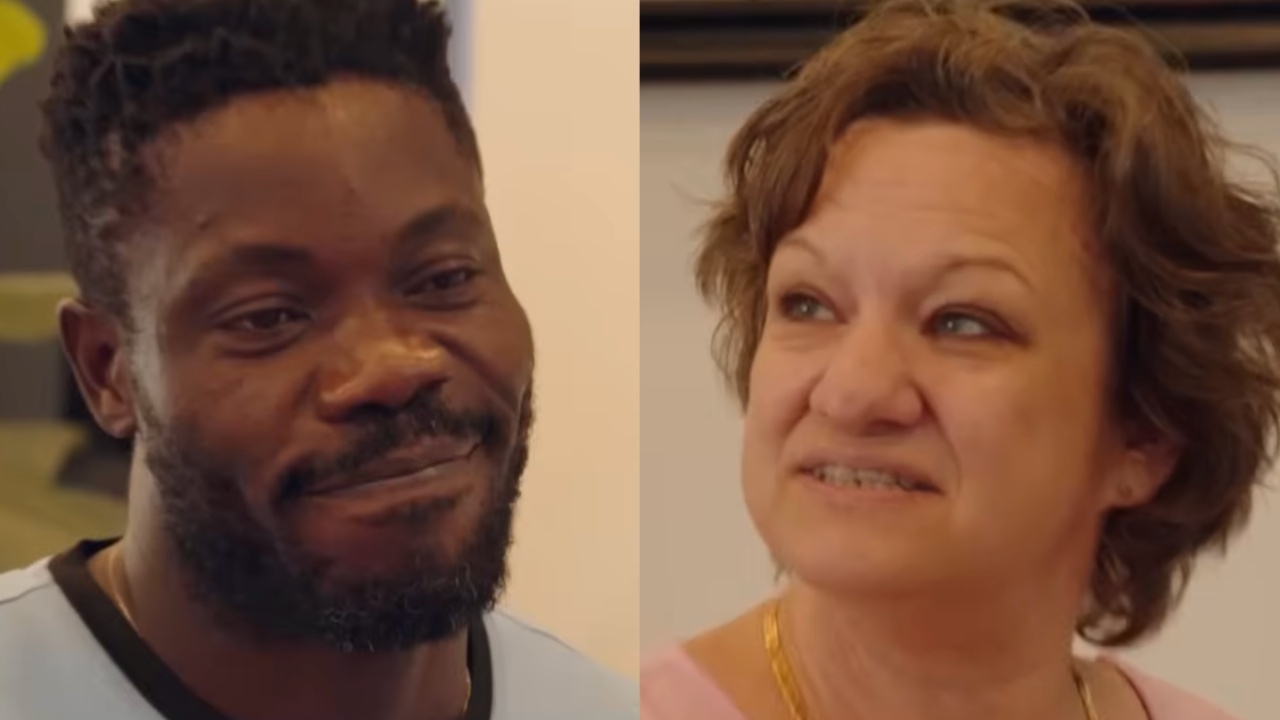Exclusive Interview: Hesher's Rainn Wilson

While screamingly funny at times, the movie Hesher is a film about pain and loss and no character displays this better than Paul Forney, played by Rainn Wilson. A radically different character than what we’ve seen Wilson as on The Office, Paul is a character filled pathos and sadness and is performed brilliantly.
Last week I had the pleasure of sitting down with Wilson one-on-one to discuss the film, as well as the major shake-up that recently occurred on The Office with the departure of Steve Carell. Check out the interview below in which we talk about Paul’s psychology, Hesher’s philosophy, and a Michael-less future for Dwight K. Schrute.
I just saw you when you did press for Super a couple of weeks ago.
Yep, I’m doing the rounds.
Are you enjoying it?
Sometimes yeah, actually. I enjoy deep probing, honest discussions about films and the journey about making them. I don’t enjoy stupid, silly, superficial questions that get asked over and over again. But that being said, it’s hard, because you have a website or something like that and you’re trying to satisfy your fans, and like, what do they want to hear, what kind of questions are they gonna want. Not everyone can be Charlie Rose.
Well I do actually have a kind of philosophical question to start off with, which is, this kind of film seems to ascribe to two separate philosophies, one being that when your life is in chaos, you need to basically hit rock bottom before you can bring it all the way back. And also, at the same time, you may have lost something, in order to survive you need to appreciate what you have. Would you say that you agree with those two ideas?
Your Daily Blend of Entertainment News
I think those are really expertly said and I agree completely. I think that really taps into a lot of what the movie is about. There’s two journeys. Hesher’s journey is he actually comes to care about this family. He’s just using them at first and bullying them, but he actually cares about the kid and cares about the grandma, and he wants the family to survive, and I don’t think he’s cared about a family before since he was a little kid. He needs to do that in order to hit bottom and move through it. And for my character, Paul, and for my son TJ, we need to get kicked in the ass in order to actually feel our feelings and to get in touch with our grief. It’s not really a grieving family, it’s a stuck family. There’s something really refreshing about Hesher, how vital he is and how unedited he is and how raw, he just is himself.
I think one of the most fascinating lines in the film is when TJ doesn’t go to the support group with you and you say to him, “You think I want to sit around with all these losers?” I’m wondering, do you think Paul has accepted what has happened in his life, has accepted the passing of his wife? Or do you think he believes he’s actually emotionally better than those in the support group?
I think he hates, he hates how stuck he is and he recognizes it. He knows he needs help and he just has no idea what to do or how to connect with anyone or how to reach out. He looks around the room, the grief counseling room, and sees these sad sack people and he’s very judgmental of them but he’s also very judgmental of himself at the same time. I think it’s often really hard, just like it’s really hard for an addict to kind of say, to admit like, “Oh I’m an alcoholic,” you know, “I’m just like these other people.” They want to be special and different. It’s hard for him to admit, like, “I’m one of those losers. I’m one of those sad people, in old sweatpants, with crumbs in my beard,” who’s just really, really sad and needs a shoulder to cry on.
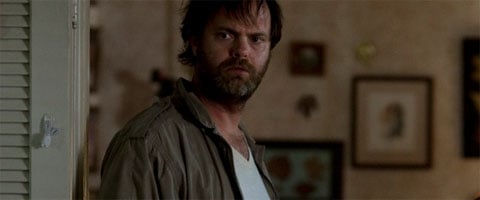
Frankly, Paul really does show a lot of signs of post-traumatic stress disorder and depression after he loses his wife. Was that something that you researched after signing on for the part?
No, I didn’t really. The thing that I thought about Paul, and the greatest challenge in the character, you know like I said before, this is not a grieving father, this is a stuck father whose wife has died, he’s living on his mom’s couch, he’s kind of in this womb-like state, living in the same sweater, popping pills. The challenge for me as an actor was like, he’s got all the emotions of the grief, and the terror, but they’re all bottled. They’re all deep, deep down inside of him. A lot of times in dramatic roles you cry, or you’re weeping, or you get Kleenexes or whatever, but this is very different in the sense that he doesn’t have access to all of that stuff. He learns how to access it through Hesher.
Was that complication something that drew you, what drew you to the part, what drew you to the film?
Yeah. There’s so much that drew me to the film. One of the things was when I first read it, I was so struck by its mix of crazy humor, absurd humor and black humor, with real sincere grief and pain and loss. And I’ve never really seen that before in a movie. And I thought that was just a really difficult thing to manage as a writer and Spencer did an amazing job.
Were you actively looking for something a bit darker? Because Dwight is kind of, he’s funny in wild card, but at the same time kind of, for the most part, a kind of bright guy. So would you say that you were looking for a contrast?
I’m always looking for that. I feel like through my whole career, I just want to play really interesting, cool, different characters. I love the fact that these were a set of colors that I’ve never played before in a character. I’ve never played a dad before, this was my first dad role, first pill-popper role, first guy who’s stuck in his grief. Yeah it’s nice to mix things up and play things different than Dwight, which I’ve been doing for the last several indies. And the indie film world is a great place to do that. So I feel really fortunate that The Office is my great day job, and my night job is I get to do these crazy, fun, weird stories.
You mentioned working with Spencer, I’m curious, this is his first feature film. Was there anything that particularly stuck out to you about the way he worked? Just in comparison to other people you’ve worked with.
He’s very hands-on. He’s very invested in all the details: Production design, he designed Hesher’s tattoos, what my sweater should be, what kind of blanket should be on the couch. He’s extremely invested in that way, and also, I love the way that he talks about the emotional qualities of the characters too. This isn’t some guy who’s like, “Yeah, in this scene we’re gonna have a dolly shot like this that’s gonna look so cool with the fog smoke machine in the background, and it’s gonna be like that scene in that Wes Anderson movie that’s like that…” you know, it’s not that kind of director talk, but just about like, here’s this guy, here’s what he’s gone through, here’s who you are, this is what you need. He has a very keen emotional sense. He had a death in his family that this is very much, in a lot of ways, emotionally based on. He was able to bring a lot to the equation.
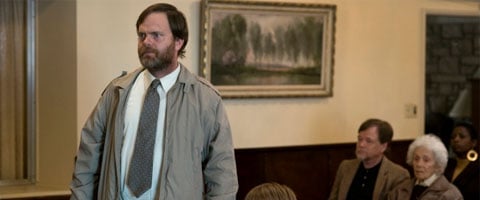
Were you able in the same way, have you ever experienced something along these same kind of lines?
No, I mean I’ve lost friends before but I’ve never lost close family members, thank God, and so I had to kind of just make up that thing. You have to do that kind of actor thing that you do, which is to just deeply pretend and deeply imagine what it would be like, which is hard work but it’s a lot of fun.
Also I wanted to ask you about working with Devin, because you often hear about how child actors can sometimes be difficult just because, their scheduling for one, but also because sometimes they’re not fully matured. I was amazed at how really, almost adult Devin seemed in this film. What was it like working with him?
I was scared working with an eleven-year-old actor who had never really acted before. I knew there was some really hard material to make work, but as soon as I started working with him and just saw how invested he was, he took it really seriously, he worked really hard, and he was so raw and truthful and emotional and present that in a way I had to step up my game really to work with him. I learned a lot working with him. So he just brought so much truth to it, and Spencer did a great job directing him in that direction.
Behind the scenes did you guys talk a lot? Did he ever ask you for advice or anything like that when it came to acting?
No, not so much. The thing is I always wanted to, I always like to goof off with kids, and stuff like that. I had to curb my impulse to just like, throw spit wads at him or pants him, or tackle him or something like that.
Was that because of the tone of the film?
Yeah, because it’s such a sad film and he’s going through so much. I didn’t want to distract him, I didn’t want to be a distraction, I just wanted to support him. I told him early on, “Look, we’ll have fun when the movie’s over but now it’s work and I’ll just show up and be your dad.”
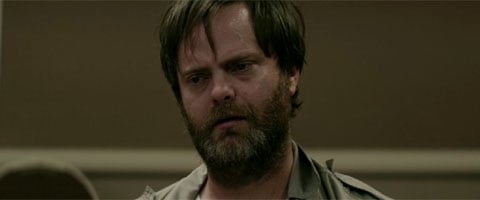
Is it kind of weird, I mean this film first premiered at the 2009 Sundance Film Festival, and it’s only now getting released, is it kind of weird that it’s taken this long and you’re just kind of reflecting back on it?
Yeah it’s been almost two years ago since I shot my stuff, but I’m glad it’s finally getting out. But it’s strange, you never know with movies. You just never know, we shot House of a Thousand Corpses in the year 2000 and I think it came out in 2003 or 2004 or something like that. You just never know what’s gonna happen with movies.
With the monumental shift recently occurring, I do want to talk a bit about The Office. I’m curious, Michael and Dwight have spent the last seven seasons developing this huge relationship. How is Dwight’s character going to change with his leaving?
Yeah, I mean I think that Dwight sees this as an opportunity. He really wants to be the manager, he’s been there for nine or ten years, he’s done everything right, he’s been the top salesman, he does everything by the book, pretty much, and he sees this as a tremendous growth opportunity. Also it’s a very interesting thing, if you look at the arc of the show, Dwight was very sycophantic to Michael for a very long time, and then they were friends and they were kind of allies for a long time, and then they had some falling outs. But over the last season or two, there have been many less Michael/Dwight storylines as Dwight has matured and kind of not taken shit from Michael and he’s kind of gone off in his own way. One thing I love about The Office is how the characters mature and change as you go along. You go to season two episode eight, the characters have very different relationships to each other than they do now.
I completely agree with that and I think evolution is the way to keep it alive. I have to assume that also keeps you invested in your own character, because if there wasn’t any movement you’d just get bored as a performer.
Yeah, absolutely. I think that’s going to be the key to season eight, is to keep things interesting in that way, not keep them static.
In “Goodbye, Michael” I could really sense the emotion when you were reading that letter. How hard was it, filming that final episode and those final scenes with Steve Carell?
Yeah it was very sad. That last week was very sad, it was very hard to make comedy. It was sad, we cried, we hugged. But then we have to move on and figure it out.
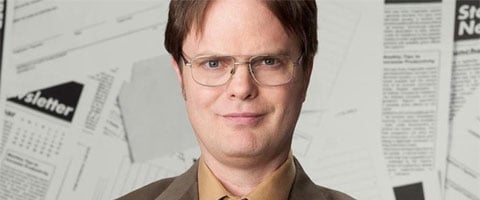
Did that kind of emotion take over? It was kind of unprecedented in the sense that he left, not in the season finale but in the middle of the season. How did that change the remaining episodes when you were filming them?
Well, like I said, it was a new challenge that arrived to The Office. As soon as he was gone it was like, okay. And then we had an episode with Will without Steve, so that was great. Then it was like, okay, how do we make this show work? Let’s put on our boots and get to work. It’s really more about that than anything else.
Do you sense a void? Do you think that in order to keep everything moving you need to basically put up blinders and charge ahead?
No, I mean we were kind of afraid of a void. I think it’s what the show needs right now, frankly, I think it needs a kick in the pants and a push in a different direction to keep it alive. I think it’s risky, but I think that it’s gonna pay off really nicely.
The season finale we’ve heard has an incredible line up of stars coming in. How was filming that? How was the experience?
Oh, it was great. I got to do a scene with James Spader who’s been a hero of mine since Sex, Lies, and Videotape. That was really, really cool. It’s a crazy episode.
Is there anything specifically that happens to Dwight?
Well nothing that I can really reveal. Dwight’s fighting to be manager and he takes that fight very, very seriously.
Ellie was telling me that she actually missed out on seeing some of the people that were there. Did you get to meet and talk with all of the guest stars?
No, I just saw Ray Romano and James Spader, and I saw Will Arnett briefly, but I didn’t get to really see any of the others.
No Jim Carrey?
No Jim Carrey, no Catherine Tate.
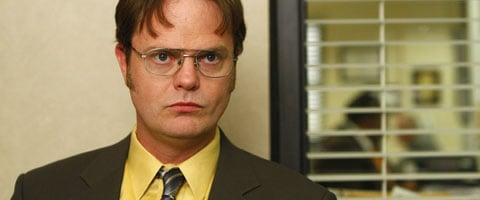
Does it disappoint you at all?
Sure. It would have been nice to have met them.
Actually, another thing, just in terms of the story arc for The Office. One thing that I’ve loved is there’s kind of this uncertainty when it comes to the “Scranton Strangler,” and I’m curious if, have we seen the last of that?
You know, I don’t know. I don’t know what’s going to happen with the Scranton Strangler. I think there’s stuff that got cut out of episodes so I’m not sure what they’re planning to do with that in the future.
What kind of stuff?
We saw scenes where he was arrested, and I think there’s other scenes where Toby was talking about the case that got cut out.
We actually saw who they arrested as the Scranton Strangler?
I think so, yeah. But I don’t know if they were gonna use that or go in a different direction, because it was on the cutting room floor.
Obviously as you mention, the relationship between Michael and Dwight is such an important one for the character. Do you think that either Dwight is going to find himself relating more to, trying to build a relationship with the new manager, or do you think it’s going to be focusing more on the people that are already in the office.
I think that the show now moves into being a full on ensemble now. So we have this great ensemble, everyone from Kevin to the accountant to Kelly Kapoor and everyone in between. So I think the show just spreads its wings a little bit and it’s not so much the Michael Scott show, it’s this great ensemble show.
I can’t wait to see what happens. So you’re headed on to hiatus now, are you working on any films at the moment?
I’m not working on anything right now, I have a lot of irons in the fires and some things getting ready to shoot this fall or maybe next spring. Well nothing I can really talk about, but there’s one script that I co-wrote called Renaissance Men. It’s a comedy set in a renaissance fair. It’s very silly but I think it’s very funny and we’re trying to get ready to shoot that next year.
Who did you work with on that?
Matt Ross from Big Love. He was the co-writer on it and we have Neil LaBute attached to direct it, and we’re just trying to attach some cast members and take it from there.
Are you going to star as well?
Yeah, I take one of the roles in it.

Eric Eisenberg is the Assistant Managing Editor at CinemaBlend. After graduating Boston University and earning a bachelor’s degree in journalism, he took a part-time job as a staff writer for CinemaBlend, and after six months was offered the opportunity to move to Los Angeles and take on a newly created West Coast Editor position. Over a decade later, he's continuing to advance his interests and expertise. In addition to conducting filmmaker interviews and contributing to the news and feature content of the site, Eric also oversees the Movie Reviews section, writes the the weekend box office report (published Sundays), and is the site's resident Stephen King expert. He has two King-related columns.
